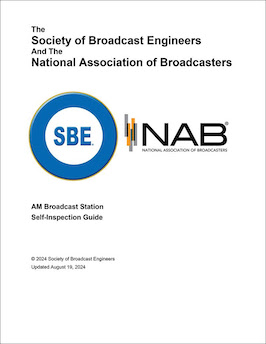The Society of Broadcast Engineers has released the latest addition to the Broadcast Station Self-Inspection Guides. The new Guide covers AM broadcast stations. The SBE released the FM and TV Guides in April 2024. The SBE partnered with the National Association of Broadcasters (NAB) to produce the Guides. These Guides are designed to aid stations and Alternative Broadcast Inspection Program (ABIP) inspectors in evaluating a broadcast station’s compliance with FCC rules and regulations.
The Guides are being developed to replace the FCC Self-Inspection Checklists that were first released in the 1990s, but had not been updated for nearly 15 years. While the previous Checklists only provided references to rules, the new SBE Guides include recommended practices for stations to establish policies and procedures for their own stations to ensure overall regulatory compliance.
The project was announced at the SBE National Meeting held in September 2023, and received widespread support from state broadcaster associations, many of which are actively involved in their own ABIP programs.
The SBE Government Relations Committee, chaired by Charles “Ched” Keiler, CPBE, 8-VSB, ATSC3, CBNE, formed a working group of SBE members in April 2022 to begin reviewing and updating the Guides. Additional Guides for other broadcast services are under review and will be released later.
SBE President Ted Hand, CPBE, 8-VSB, AMD, ATSC3, DRB, said, “The SBE is proud to offer the next edition of the Self-Inspection Guides. There was great interest in the AM version at the 2024 NAB Show, and I commend the Committee for its work in producing this version.”
The Guides are available for download from the SBE website under the Legislative/Regulatory and Resources tab. They are free to SBE members.


